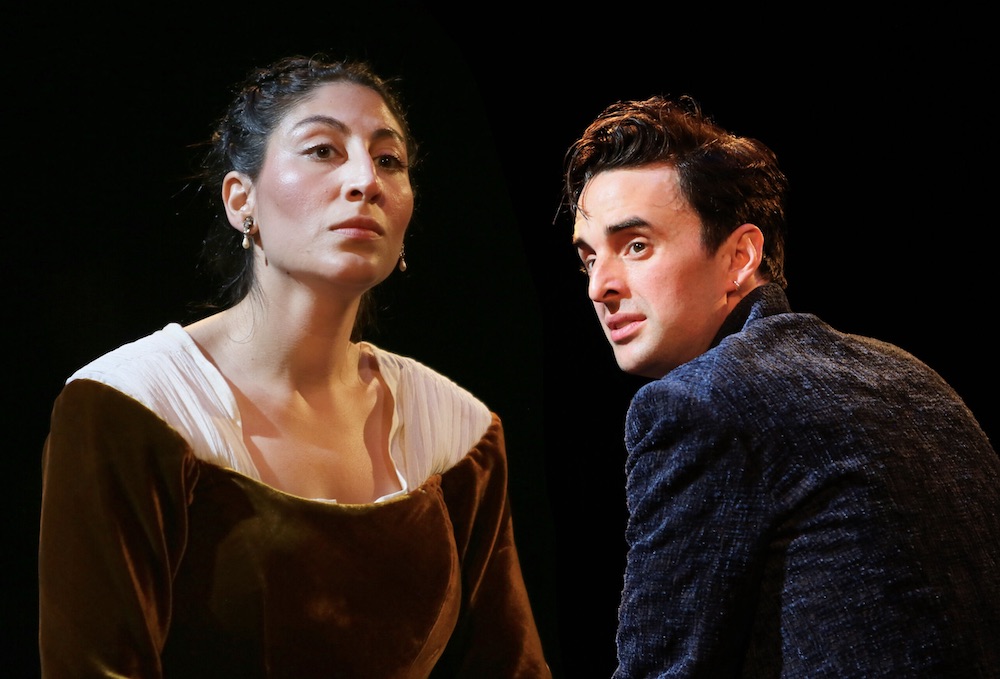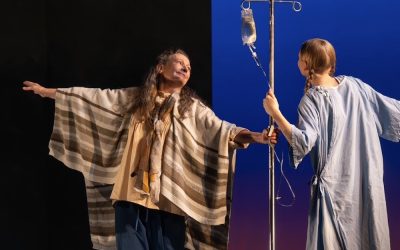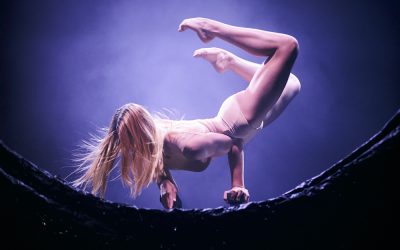Playwright Jessica B. Hill’s The Dark Lady kept me listening for the most part, but I was never fully or consistently engaged.
The Dark Lady imagines a relationship between William Shakespeare and Emilia Bassano, the first woman in England to claim the status of professional poet. Born into a family of Italian musicians who played for the English court, and who may have had Jewish origins, Bassano was unusually learned for an Elizabethan woman, having been tutored by the Dowager Countess of Kent. As an adult, Bassano is rumoured to have been the mistress of Henry Carey, who became Lord Chamberlain — and Shakespeare’s boss in the acting company the Lord Chamberlain’s Men. Some speculate that Bassano was the Dark Lady of Shakespeare’s sonnets.
The play The Dark Lady shows Bassano and Shakespeare having an intimate, sometimes sexual relationship that lasts for decades, and Hill’s play attributes much of the inspiration behind Shakespeare’s scripts — and even specific passages of text — to Bassano. But here’s the rub: there’s no concrete evidence that Bassano and Shakespeare ever met, so, as an audience member, I tripped on the gap between known and imagined realities. Too often I found myself thinking, “This feels extremely unlikely, given the lack of evidence. Why would I invest in it?”
To be clear, I have no doubt that the talents and contributions of women have been erased for centuries but Hill’s speculation strikes me as too weak a vessel to contain the idea. Besides, Hill’s supposedly feminist strategy assumes that Bassano is only of interest as a footnote to Shakespeare. Surely, she’s interesting enough in her own right.
That said, The Dark Lady did engage me more rewardingly sometimes. In the early going, Bassano and Shakespeare spar — fruitfully. She insists that he should write female characters who have more agency, and it’s fun to follow this idea chronologically as Shakespeare produces work, starting with The Two Gentlemen of Verona, in which the women are pawns, and advancing through Much Ado About Nothing and Romeo and Juliet, in which the female characters are more fully developed.
And the play allows ample room for physicalization. In the opening sequence, Bassano and Shakespeare converse while performing an extended courtly dance. Later, the two characters draw long bolts of burgundy fabric from Ryan Cormack’s set and wrap themselves in it, evoking their sexual intimacy. Speaking of sex, the play’s most erotic scene (for me) involves cross-dressing: Bassano convinces Shakespeare to wear her skirt as she dons his trousers. It’s edgy and it’s kind of hot.
There’s further queer speculation. Bassano asks Shakespeare if he’s in love with the Earl of Southampton. In scholarly circles, the nature of this relationship is discussed, although there’s no compelling proof of a romance.
But then, for a long chunk in the second half, The Dark Lady flatlines. Bassano is desperate to have her work published and Shakespeare repeatedly avoids her pleas for help — repeatedly being the operative word. The Dark Lady keeps hitting the same note and so does actor Arghavan Jenati, who’s playing Bassano. Because, under Moya O’Connell’s direction, Jenati continuously offers Bassano’s big emotions in an externalized, declamatory manner, she finds little nuance in the character’s frustration and rage.
Nathan Kay’s internality as Shakespeare is more successful. When Bassano’s infant daughter dies, Jenati performs loud grief. When Shakespeare’s young son dies, Kay’s Shakespeare crumples into himself, which is more moving.
I’m not knocking Jenati’s entire performance: she also accesses intelligence and stillness.
A final comment on the script: throughout the years covered, Bassano’s primary goal is recognition for herself and her work. Then, in a resolution that includes a ridiculous, pop-up tombstone in this mounting, she decides that her implied presence in the Great Man’s work is sufficiently rewarding and all is forgiven. Really?
There’s no doubting the ambition of The Dark Lady. I wish it were more satisfying.
THE DARK LADY by Jessica B. Hill. Directed by Moya O’Connell. A Bard on the Beach production running in rep in the Douglas Campbell tent until September 19. (Tickets and information)
PHOTO CREDIT: (Photo of Arghavan Jenati and Nathan Kay by Tim Matheson)
BUT WAIT! THERE’S MORE! You can get all my current reviews PLUS curated local, national, and international arts coverage in your inbox FREE every week if you subscribe to Fresh Sheet, the Newsletter. Just click that link. (Unsubscribe at any time. Super easy. No hard feelings.) Check it out.






0 Comments